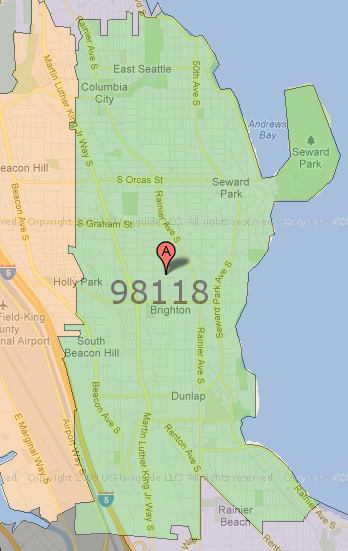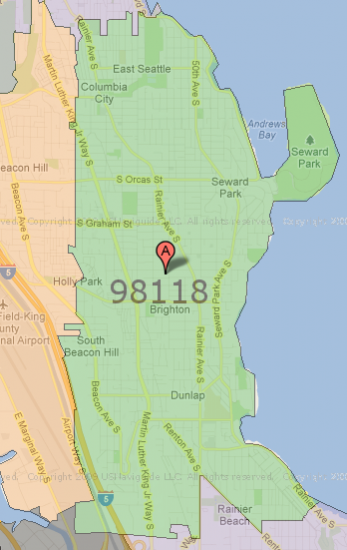The 98118 zip code has earned a reputation as a delightfully diverse zip code. And it’s easy to see why: a stroll down the streets of a neighborhood like Columbia City or Othello reveals a mosaic of cultures, ethnicities, nationalities, and languages. It’s a zip code where you might find a southern barbecue joint, an Asian grocery, and an east African restaurant, all cheek to jowl on the same commercial strip.
A few years back, though, someone started circulating the idea that 98118 wasn’t merely somewhat diverse, but actually ranked as the most diverse zip code in the entire US. The press lapped it up. KOMO TV covered it as established fact; so did AOL News. Even today, an internet search for “most diverse zip code” points straight to 98118. Most of the stories emphasize not only the zip code’s diversity but also its friendliness, verve, and general awesomeness—suggesting that the area in South Seattle might serve as something of a model for a steadily diversifying nation.
Yet while 98118 is undoubtedly a cultural kaleidoscope, it struck me as a bit surprising that it ranked as the most diverse place in the country, ahead of melting pot neighborhoods in one of the many US cities—New York, L.A., Miami, Houston—that are far less homogeneous than Seattle.
And it turns out that there’s good reason for doubt. Observing diversity is one thing; measuring it is another. And the people who really know how to measure diversity find that the story about 98118 is just an urban legend; there are plenty of US zip codes more diverse than 98118.
Historylink has the scoop, with numbers from a thoughtful analysis by demographer Diana Canzoneri:
98118…is the third most diverse in Washington state, after 98178 (covering the Bryn Mawr and Skyway neighborhoods) and 98188 (SeaTac and Tukwila). Out of 17,000 [zip codes] for metropolitan areas nationwide, it’s number 64. [Links added.]
Hey, #64 in the country ain’t bad!! But it’s not #1. (Just sayin’.)
More recently, real estate firm Trulia looked at another measure of diversity, and also concluded that 98178 beats 98118 in the diversity sweepstakes. In fact, 98178 (which, to be fair, is just to the south of 98118) is pretty hard to beat nationwide: Trulia ranks it as the 7th most diverse zip code in the US, trailing only a few neighborhoods in Dallas, New York, San Francisco, Houston, and Honolulu.
So the Seattle area really is home to one of the nation’s most diverse zip codes. It’s just not the one that everyone thinks.
Of course, these analyses raise an interesting question: how in the heck do you measure diversity, anyway? As it turns out, there are a bunch of diversity metrics, many of them pioneered by ecologists hoping to quantify the diversity of an ecosystem. Trulia’s method picks out places with the smallest plurality: that is, a place ranks as diverse if its most numerous racial or ethnic group is still a pretty small share of the population. In 98178, for example, the largest census-defined racial group represents just 28.7 percent of the population—meaning that the most numerous group includes only about one resident in four. The diversity measure highlighted in the Historylink article is a bit more sophisticated: it’s called the “Gini-Simpson Index,” and rather than bore you with the details I’ll just point you over to Wikipedia, with the warning that you’ll probably need some patience to figure it all out.
Regardless, there are two lessons here. First, the Seattle metro area really does have some genuinely diverse places that are also great places to live, work, and spend time. But second…before you trust stories that sound like they might be urban legends, it always pays to do the math.



Comments are closed.